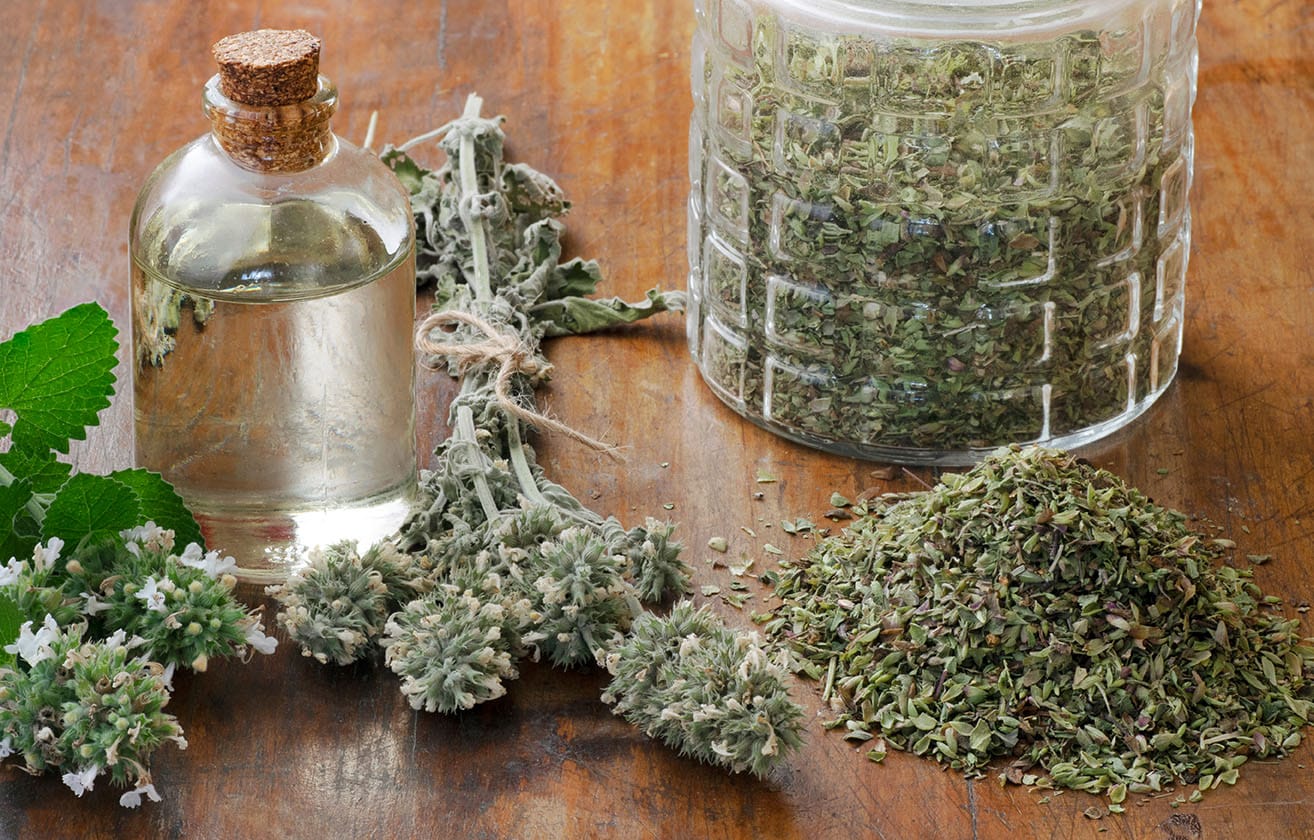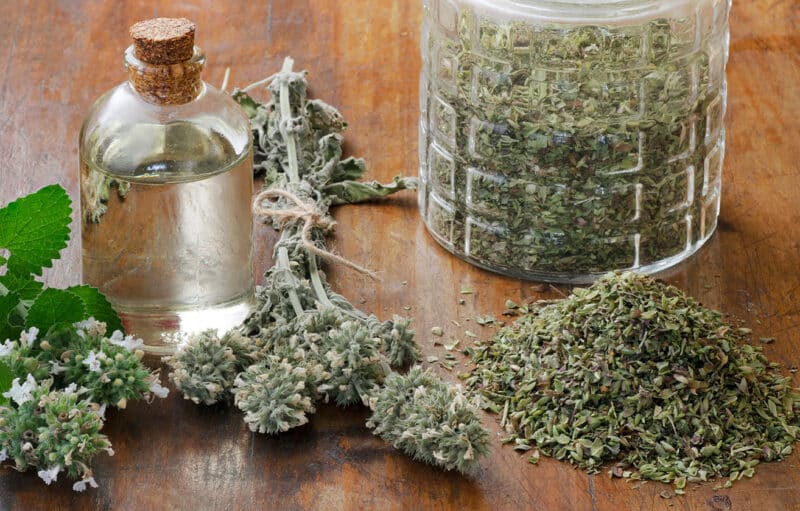Click to Skip Ahead
Most of us have watched hilarious videos of cats rolling around in catnip and acting like crazy screwballs. Some cats seem to mellow out, while others go a little berserk, but what is it about catnip that has this effect on cats? Furthermore, would catnip have any effect on humans? Is it something we can take to help calm us down or even act as a stimulant, and is it even safe for us?
Catnip is generally safe for humans to take in small doses. It should not be consumed by children or women who are pregnant or breastfeeding and is best taken in tea form.
We’ll look at everything catnip so you can have a better idea about whether or not you should ingest it and how it will affect you overall.

All About Catnip
You might be surprised to discover that catnip, or Nepeta cataria, is a member of the mint family. It’s also known as catwort and catmint and is native to Asia, Africa, and Europe but has been naturalized and grows prolifically in North America.
It’s a perennial plant with oval, toothed green leaves, and topped with white to purple flowers, and can grow up to 3 feet. It blooms from late spring into the fall and is relatively easy to cultivate if you decide to grow some in your garden.

Cats and Their Sense of Smell
Cats have an extra special gland called the Jacobson’s organ (or the vomeronasal organ) found on the roof of the mouth and near the nasal cavity. It allows cats to “taste” scent particles they pick up in the air.
Have you ever seen your cat stick their nose on something, smell it for a while, and then sit up with their mouth partially open? That is your cat using her Jacobson’s organ, and the reaction is called the flehmen response. This allows that fascinating scent to go through the organ instead of the normal airway so they can get a good whiff.
This is our long-winded way of explaining that cats not only have an amazing sense of smell but are uniquely wired to enjoy certain scents.
The Effect of Catnip on Cats
We know cats love catnip, so let’s look briefly at what happens when your cat encounters it. Catnip contains an oil called nepetalactone, which is the primary suspect in how cats react to this herb. It has been studied, and the results have shown that it is the cat’s primary olfactory system, or good old-fashioned sense of smell, that causes the catnip reaction.
Cats will demonstrate various behaviors, from aggression and playfulness to affection and happiness.
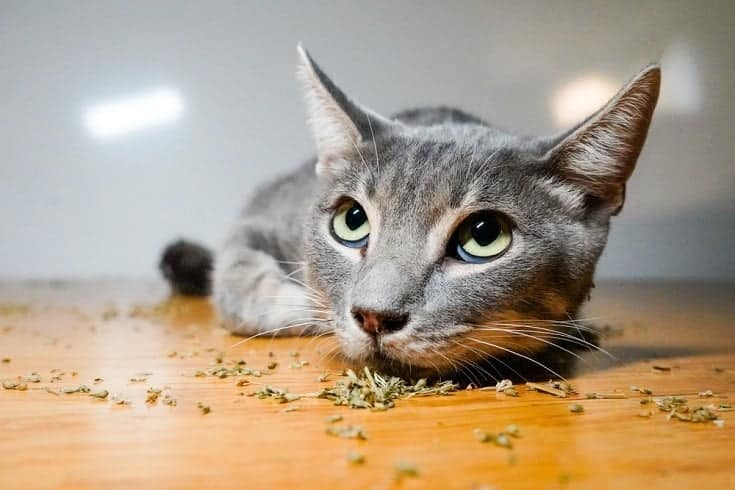
Some Facts About Cats and Catnip
- Only 50% to 75% (typically 60%) of cats react to catnip.
- Simply sniffing at the catnip can provide a stimulant effect.
- Eating the catnip will act as more of a sedative.
- The effects of catnip only last about 10 to 15 minutes.
- Cats typically need to wait several hours before they can “appreciate” the benefits of catnip again.
The Effects of Catnip on Humans
The earliest documentation of catnip was in 1735 as an herbal tea in the General Irish Herbal. However, it has been in use as a part of folk medicine for much longer. There are several reported benefits for humans who consume catnip.
Calming Effect
Many people take catnip for its sedative and calming effects, but no scientific evidence supports this. However, the nepetalactone that makes the cats go crazy has similar properties found in valerian, which is also a popular botanical sedative. People take catnip to help with:
- Insomnia
- Anxiety and stress
- Agitation and restlessness

Gastrointestinal
It is thought that catnip can assist with a variety of gastrointestinal issues.
- Indigestion
- Gas
- Diarrhea
- Increased appetite
- Cramps
Diuretic
It has been known to increase urination and decrease water retention. This can benefit various conditions, such as high blood pressure and edema.
Toothaches
Catnip has been used as a tea or poultice for centuries to treat toothaches. Studies have shown that catnip has antifungal and antibacterial properties that effectively deter and treat oral infections.
Insect Repellent
In a 2001 study, the catnip’s nepetalactone oil is approximately 10 times more effective than the DEET chemical for repelling mosquitoes. DEET is a chemical compound commonly used in many commercial insect repellents.
If you have catnip in your garden and you’re in a rush to stop insects from biting, you can crush up the leaves and rub them directly on your skin. It won’t last very long, but it should prove quite effective; just test a small spot of skin first to ensure you are not allergic.

And Finally
Catnip has also been used to reduce sweating, bring about menstruation, help with arthritis, and treat the common cold and flu (including coughs and fevers).
Unfortunately, there haven’t been enough studies to prove if catnip is effective for any of these conditions, except for insect repellent. More research should be carried out before the effectiveness of catnip for humans can be assessed.
Catnip Tea
If you’re interested in trying catnip as a tea, here is a simple recipe:
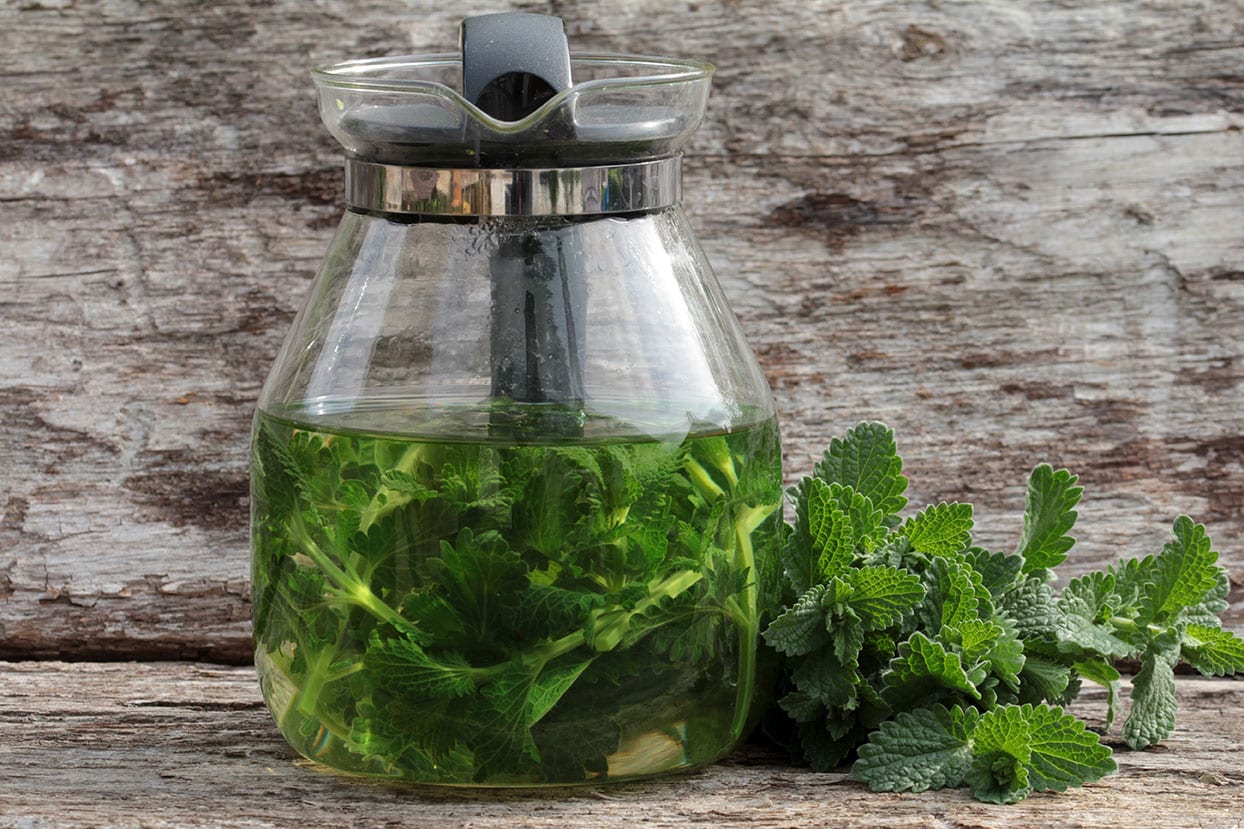
- 2 teaspoons of dried or fresh leaves or flowers of the catnip plant
- I cup boiling water
- Lemon juice
- Honey or sugar
Mix the catnip leaves or flowers with the water. Don’t add the leaves to the water while it’s boiling, or you might lose some of its valuable benefits.
It’s not the strongest tea, so let it steep for at least 10 to 20 minutes. You can add other herbs for extra flavor, like mint leaves, which can enhance the subtle mintiness of catnip.
Strain and add the lemon, honey, or sugar. The best tea is with fresh catnip, but if you decide to purchase it dried, be sure it’s not the same dried catnip meant for cats.
Some Warnings
Always consult your doctor if you suspect you have any serious health conditions, and don’t just rely on any one herbal remedy. While some people like to smoke it, it should be noted that catnip burns quickly and needs to be mixed with tobacco.
It has been reported that some people thought it wasn’t worth smoking since they became ill and were subjected to headaches and vomiting.
- Avoid if pregnant or breastfeeding
- Don’t ingest if you have pelvic inflammatory disease (PID)
- Don’t consume if you are allergic to mint
- Avoid giving it to young children or babies
- Keep away from eyes
- Do not take catnip if driving or operating heavy equipment
- Avoid ingesting if you have a heavy menstrual cycle
Two to three cups of tea a day should be okay, but be sure not to consume too much, or you could end up with side effects.
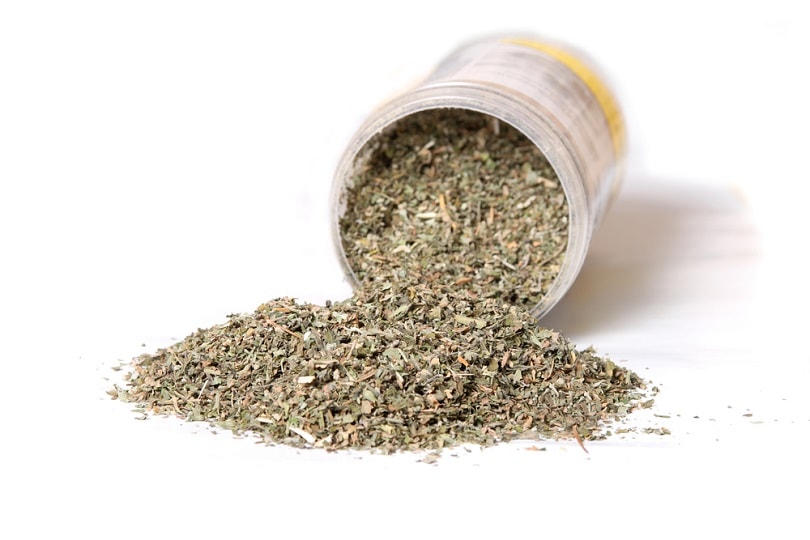
Side Effects
Generally speaking, catnip is usually safe for most people to consume, but it’s recommended to take it in tea form or add a few drops of extract to your drink:
- Upset stomach and vomiting
- Skin and eye irritation
- Headache
- Drowsiness
- Uterine contractions
If these side effects develop, stop consuming catnip and speak to your doctor.
Conclusion
While we might not have the same experiences with catnip as our beloved felines, it seems worth exploring for many of its benefits for both species. While more research needs to be done to check on these claims, there are several people with personal stories on the benefits of catnip.
If you’ve decided to try catnip tea, be sure to have some on hand for your cat, or you might have to drink it in a separate room!
Featured Image Credit By: Gaston Cerliani, Shutterstock

